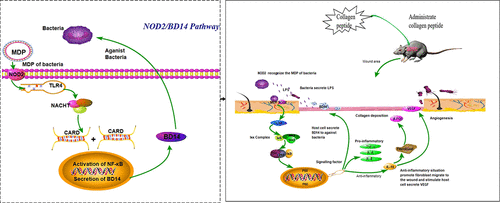当前位置:
X-MOL 学术
›
J. Agric. Food Chem.
›
论文详情
Our official English website, www.x-mol.net, welcomes your
feedback! (Note: you will need to create a separate account there.)
Collagen Peptides Isolated from Salmo salar and Tilapia nilotica Skin Accelerate Wound Healing by Altering Cutaneous Microbiome Colonization via Upregulated NOD2 and BD14.
Journal of Agricultural and Food Chemistry ( IF 5.7 ) Pub Date : 2020-01-22 , DOI: 10.1021/acs.jafc.9b08002 Fengfeng Mei 1, 2 , Jingjie Liu 2 , Jintao Wu 2 , Zhouwei Duan 3 , Muxue Chen 1, 2 , Keke Meng 1, 2 , Shenjun Chen 4 , Xuanri Shen 1, 2, 5 , Guanghua Xia 1, 2, 5 , Meihui Zhao 2
Journal of Agricultural and Food Chemistry ( IF 5.7 ) Pub Date : 2020-01-22 , DOI: 10.1021/acs.jafc.9b08002 Fengfeng Mei 1, 2 , Jingjie Liu 2 , Jintao Wu 2 , Zhouwei Duan 3 , Muxue Chen 1, 2 , Keke Meng 1, 2 , Shenjun Chen 4 , Xuanri Shen 1, 2, 5 , Guanghua Xia 1, 2, 5 , Meihui Zhao 2
Affiliation

|
Collagen peptides can promote wound healing and are closely related to microbiome colonization. We investigated the relationship among collagen peptides, wound healing, and wound microflora colonization by administering the murine wound model with Salmo salar skin collagen peptides (Ss-SCPs) and Tilapia nilotica skin collagen peptides (Tn-SCPs). We analyzed the vascular endothelial growth factor (VEGF), fibroblast growth factors (β-FGF), pattern recognition receptor (NOD2), antimicrobial peptides (β-defence14, BD14), proinflammatory (TNF-α, IL-6, and IL-8) and anti-inflammatory (IL-10) cytokines, macrophages, neutrophil infiltration levels, and microbial communities in the rat wound. The healing rates of the Ss-SCP- and Tn-SCP-treated groups were significantly accelerated, associated with decreased TNF-α, IL-6, and IL-8 and upregulated BD14, NOD2, IL-10, VEGF, and β-FGF. Accelerated healing in the collagen peptide group shows that the wound microflora such as Leuconostoc, Enterococcus, and Bacillus have a positive effect on wound healing (P < 0.01). Other microbiome species such as Stenotrophomonas, Bradyrhizobium, Sphingomonas, and Phyllobacterium had a negative influence and decreased colonization (P < 0.01). Altogether, these studies show that collagen peptide could upregulate wound NOD2 and BD14, which were implicated in microflora colonization regulation in the wound tissue and promoted wound healing by controlling the inflammatory reaction and increasing wound angiogenesis and collagen deposition.
中文翻译:

从Salmo salar和Nilapia nilotica皮肤分离的胶原蛋白肽通过上调NOD2和BD14改变皮肤微生物组定植来加速伤口愈合。
胶原蛋白肽可以促进伤口愈合,并且与微生物组定植密切相关。我们通过将鼠伤模型与Salmo撒拉人皮肤胶原蛋白肽(Ss-SCPs)和罗非鱼尼罗罗非鱼皮肤胶原蛋白肽(Tn-SCPs)一起给药,研究了胶原蛋白肽,伤口愈合和伤口菌群定植之间的关系。我们分析了血管内皮生长因子(VEGF),成纤维细胞生长因子(β-FGF),模式识别受体(NOD2),抗菌肽(β-defence14,BD14),促炎性(TNF-α,IL-6和IL- 8)和大鼠伤口中的抗炎(IL-10)细胞因子,巨噬细胞,中性粒细胞浸润水平和微生物群落。Ss-SCP和Tn-SCP治疗组的治愈率显着提高,与TNF-α,IL-6和IL-8降低以及BD14,NOD2上调相关,IL-10,VEGF和β-FGF。胶原蛋白肽组的愈合加快表明,伤口微生物群(如亮葡菌球菌,肠球菌和芽孢杆菌)对伤口愈合有积极作用(P <0.01)。其他微生物组物种,如嗜麦芽窄食单胞菌,缓生根瘤菌,鞘氨醇单胞菌和毛状芽孢杆菌,均具有负面影响,并降低了定植率(P <0.01)。总而言之,这些研究表明胶原蛋白肽可以上调伤口NOD2和BD14,这与伤口组织中菌群定植有关,并通过控制炎症反应,增加伤口血管生成和胶原蛋白沉积促进伤口愈合。芽孢杆菌和芽孢杆菌对伤口愈合有积极作用(P <0.01)。其他微生物组物种,如嗜麦芽窄食单胞菌,缓生根瘤菌,鞘氨醇单胞菌和毛状芽孢杆菌,均具有负面影响,并降低了定植率(P <0.01)。总而言之,这些研究表明胶原蛋白肽可以上调伤口NOD2和BD14,这与伤口组织中菌群定植有关,并通过控制炎症反应和增加伤口血管生成和胶原蛋白沉积促进伤口愈合。芽孢杆菌和芽孢杆菌对伤口愈合有积极作用(P <0.01)。其他微生物组物种,如嗜麦芽窄食单胞菌,缓生根瘤菌,鞘氨醇单胞菌和毛状芽孢杆菌,均具有负面影响,并降低了定植率(P <0.01)。总而言之,这些研究表明胶原蛋白肽可以上调伤口NOD2和BD14,这与伤口组织中菌群定植有关,并通过控制炎症反应,增加伤口血管生成和胶原蛋白沉积促进伤口愈合。
更新日期:2020-02-03
中文翻译:

从Salmo salar和Nilapia nilotica皮肤分离的胶原蛋白肽通过上调NOD2和BD14改变皮肤微生物组定植来加速伤口愈合。
胶原蛋白肽可以促进伤口愈合,并且与微生物组定植密切相关。我们通过将鼠伤模型与Salmo撒拉人皮肤胶原蛋白肽(Ss-SCPs)和罗非鱼尼罗罗非鱼皮肤胶原蛋白肽(Tn-SCPs)一起给药,研究了胶原蛋白肽,伤口愈合和伤口菌群定植之间的关系。我们分析了血管内皮生长因子(VEGF),成纤维细胞生长因子(β-FGF),模式识别受体(NOD2),抗菌肽(β-defence14,BD14),促炎性(TNF-α,IL-6和IL- 8)和大鼠伤口中的抗炎(IL-10)细胞因子,巨噬细胞,中性粒细胞浸润水平和微生物群落。Ss-SCP和Tn-SCP治疗组的治愈率显着提高,与TNF-α,IL-6和IL-8降低以及BD14,NOD2上调相关,IL-10,VEGF和β-FGF。胶原蛋白肽组的愈合加快表明,伤口微生物群(如亮葡菌球菌,肠球菌和芽孢杆菌)对伤口愈合有积极作用(P <0.01)。其他微生物组物种,如嗜麦芽窄食单胞菌,缓生根瘤菌,鞘氨醇单胞菌和毛状芽孢杆菌,均具有负面影响,并降低了定植率(P <0.01)。总而言之,这些研究表明胶原蛋白肽可以上调伤口NOD2和BD14,这与伤口组织中菌群定植有关,并通过控制炎症反应,增加伤口血管生成和胶原蛋白沉积促进伤口愈合。芽孢杆菌和芽孢杆菌对伤口愈合有积极作用(P <0.01)。其他微生物组物种,如嗜麦芽窄食单胞菌,缓生根瘤菌,鞘氨醇单胞菌和毛状芽孢杆菌,均具有负面影响,并降低了定植率(P <0.01)。总而言之,这些研究表明胶原蛋白肽可以上调伤口NOD2和BD14,这与伤口组织中菌群定植有关,并通过控制炎症反应和增加伤口血管生成和胶原蛋白沉积促进伤口愈合。芽孢杆菌和芽孢杆菌对伤口愈合有积极作用(P <0.01)。其他微生物组物种,如嗜麦芽窄食单胞菌,缓生根瘤菌,鞘氨醇单胞菌和毛状芽孢杆菌,均具有负面影响,并降低了定植率(P <0.01)。总而言之,这些研究表明胶原蛋白肽可以上调伤口NOD2和BD14,这与伤口组织中菌群定植有关,并通过控制炎症反应,增加伤口血管生成和胶原蛋白沉积促进伤口愈合。











































 京公网安备 11010802027423号
京公网安备 11010802027423号